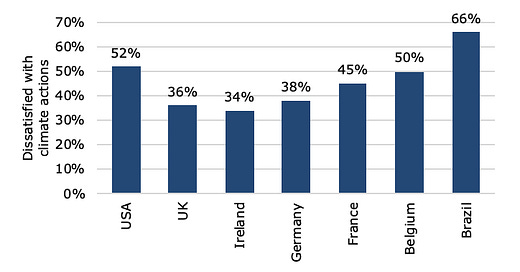People aren’t happy about climate action
Last week, the UN held a mini climate summit in New York and UN Secretary General Antonio Guterres challenged global leaders to come up with “concrete and transformative plans” to fight climate change. The UN even went as far as banning any speaker from the dais who did not come up with a concrete proposal and commitment to fight climate change. No wonder the climate summit only lasted for one day.
But let’s not focus on the fact that I would advocate for this restriction on speakers to be applied in every Parliament in every country.
The dissatisfaction of the public with their leaders when it comes to fight climate change is palpable everywhere. In Germany, the current government managed to come up with a climate action plan recently that was so weak and noncommittal that it created a fire storm of criticism from all sides of the political spectrum (except the Alternative für Deutschland, the sole party in Germany that denies climate change).
Gallup then published the results of a global survey on how satisfied people are in general with the actions taken to fight climate change. The chart below shows that in countries like Germany, the UK or Ireland, less than 40% of people are dissatisfied with climate action. But these are countries that are at the forefront of the fight against climate change. In these countries, climate change is a major topic that is frequently discussed in the media and there is substantial public pressure on political and business leaders to fight climate change.
In countries like the US, on the other hand, more than half the population is dissatisfied with the actions taken so far to combat climate change and in Brazil, this share is as high as two out of three people.
Dissatisfaction with climate action

Source: Gallup.
In the US, this dissatisfaction with politicians can easily be traced to the election of Donald Trump as President. Under both George W. Bush and Barack Obama about 60% of the American public was satisfied with the actions taken to fight climate change. With the election of Donald Trump, this share immediately dropped below 50% and has remained there ever since.
According to the Yale Prgram on Climate Communication, 60% of Americans think that the President should do more to address global warming. What is astonishing is that in these polarized times, practically every county in the US shows a majority of people who think the President needs to step up (yellow- and orange-coloured counties in the chart below). Even in deep red states like West Virginia and Kentucky that have a major coal industry, a majority of citizens thinks the President needs to do more to address global warming.
Share of Americans who think the President should do more to address global warming

Source: Yale Program on Climate Change Communication
But as I went through the results of the Yale Program on Climate Change, I noticed one really surprising result. Apparently, 70% of the population in the US thinks that environmental protection is more important than economic growth. This is astonishing, since the US is the one country in the world where economic growth is like a fetish. Absolutely everything has to be done to maximise growth, no matter the long-term consequences.
If we look at the chart below, we again see a clear nationwide consensus in favour of environmental protection. Cynics may argue that people only prefer environmental protection over economic growth as long as they have a job, but the overall majority is so large, that it is hard to argue that people are ignorant about potential trade-offs between economic growth and environmental protection. About twice as many people give preference for environmental protection over economic growth than the other way around. In my view, politicians should take heed of these results and businesses who think they can continue with business as usual should be aware that there is a massive public backlash waiting for them the moment they pollute the environment and this is picked up in the media.
Share of Americans who think environmental protection is more important than economic growth

Source: Yale Program on Climate Change Communication



